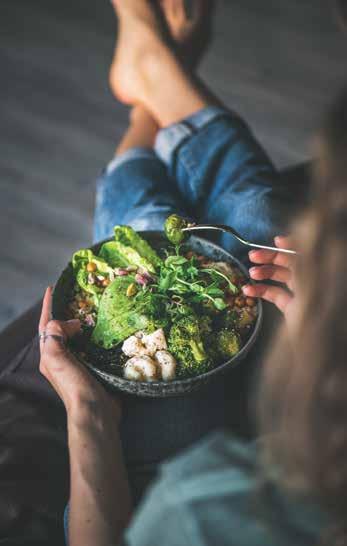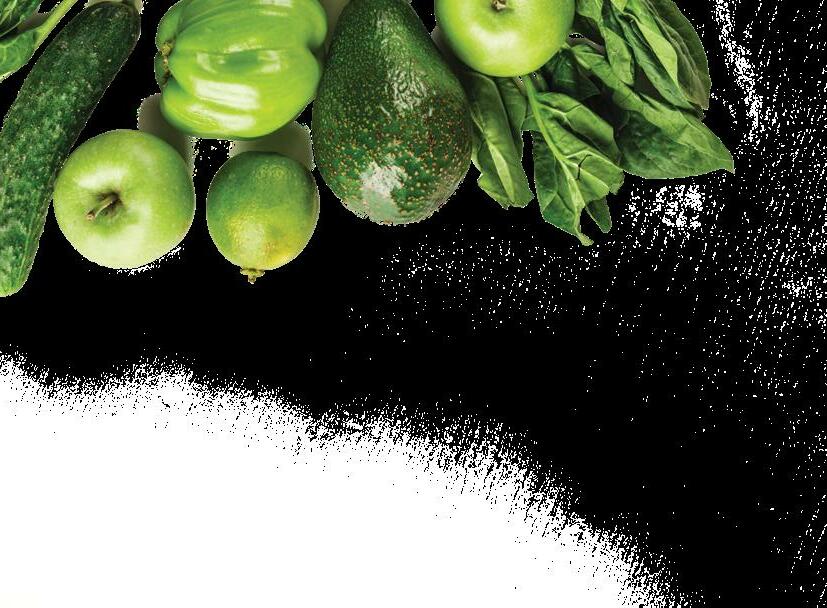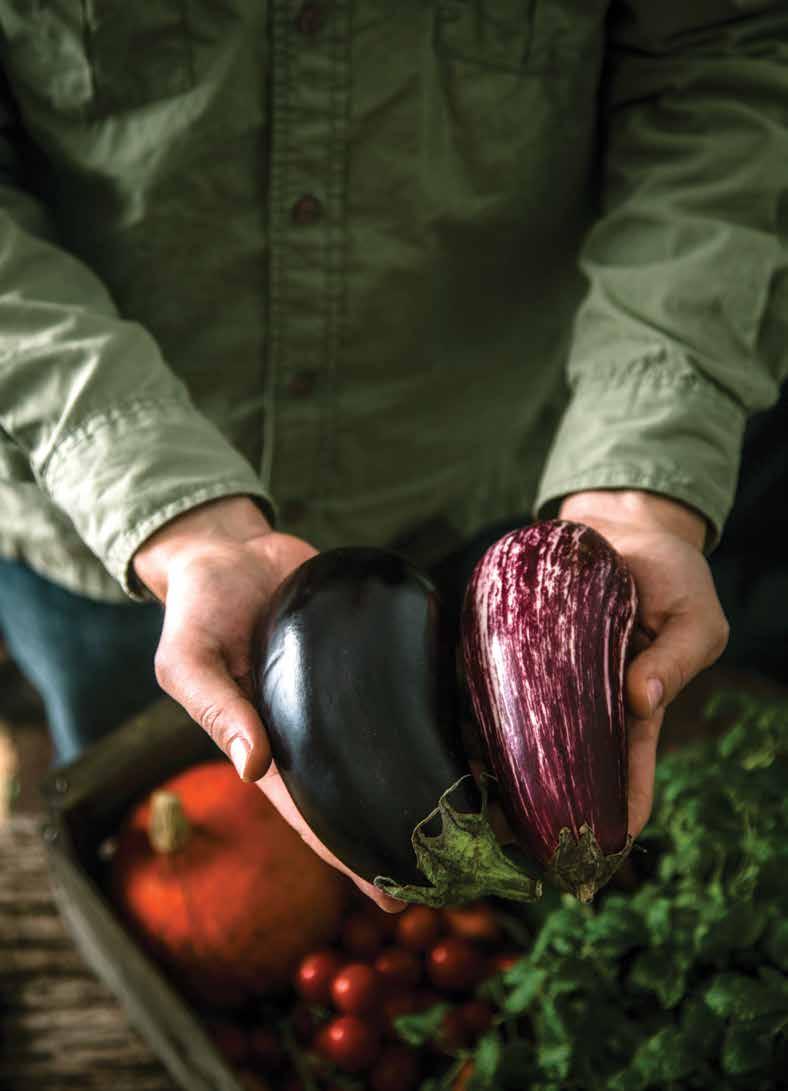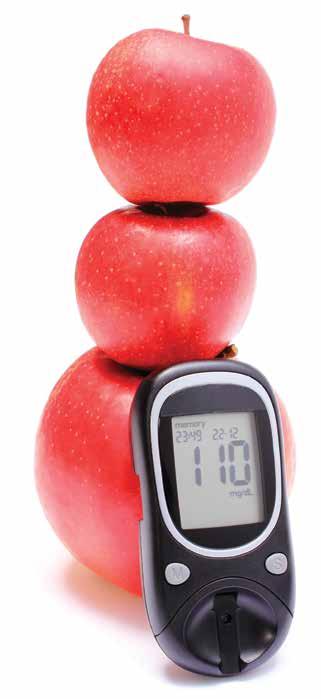
13 minute read
A "22-DAY LIFESTYLE CHALLENGE" TOWARD REVERSING DIABETES
BY: JONI BOKOVOY, DR.P.H., R.N.
What would you like your story to be in 2022? If you have diabetes or pre-diabetes, there is now significant research evidence that you can change your story. People pay thousands of dollars at lifestyle centers and spas to jumpstart their lifestyle change where dieticians and fitness coaches map out what they need to do. You can make the same changes at home and experience dramatic improvements in your health and well-being.
Instead of managing your diabetes, you can reverse it so that you no longer meet the criteria for diabetes. Exciting? I challenge you to participate in a 22-day challenge that will address many of the causes of your diabetes or pre-diabetes. Things you learn during the challenge can also keep you from getting diabetes if you are at risk, especially if you are currently overweight and/or unfit. If you can’t do the entire 22 days, do it for 14 days (that is usually when participants begin seeing changes in blood glucose and weight) or at least seven days (where you will still experience improvements in your digestion and know that you can survive on a whole plant-based diet).
This challenge will take you out of your comfort zone, but you can do it! And yes, diet and exercise are a big part of it. To do this challenge you will need to be creative and tenacious. You can do it! Here is a summary of the challenge:

1. Eat only whole plant-based food (containing less than 30 grams of plantbased fat) each day, avoiding all highly refined, processed foods. 2. Walk 15-20 minutes after each meal and do a type of aerobic exercise you enjoy for at least 30 minutes, at least times per week. 3. Maintain any existing good health habits like getting enough rest (6-8 hours sleep, 8 cups of water a day)
Throughout my life I have had the opportunity to help people make tough changes. The strategies I have learned have helped me in my own life, and I will use them as I take on this challenge along with you. Here we go.
Prepare
• Look over the challenge and your schedule to decide when best to start the challenge and set a start date • Find a partner (or two) to participate in the challenge • If you are on insulin or other medications, let your physician know about the lifestyle changes you plan to make.
Some participants have seen big improvements even after just a few weeks that may necessitate medication adjustments for blood glucose, blood pressure or other medications. • Write down all the foods you eat and beverages you drink for one day. • Circle all foods that are whole plant foods. • Circle all beverages that are pure water or are made from whole plants (fruits, vegetables). For the purposes of this challenge we are keeping it simple: count up the total number of items you ate or drank. • Now count all of the circled items.
Whole Plant Items / All Items = approx. % of your diet that is whole plant – based.
Take Action
• Ease into the challenge by giving yourself a “trial run” week.
During that week, test out all the activities you plan to do during the challenge. Doing this will help you be well prepared once your challenge starts. Some people find it helpful to start a journal during this time. Others make electronic or mental notes of what will help make the challenge a success. • Set start and stop dates and times.
Highlight days 7, 14, and 21. • Start. Remember, the goal is to jumpstart your health journey.
Challenge yourself to do as many of the following health activities as possible.
Body
• Walk 15-20 minutes after EVERY meal for all 22 days. (This does not need to be a power walk. Just walk at a comfortable pace.) If you eat three meals a day, you will have walked at least 45 minutes each day. Blood sugars tend to spike after every meal and this will help normalize your blood sugar.




• Eat primarily unprocessed or minimally processed (such as frozen or dried) whole plant foods. You choose what percent of your diet comes from whole, plant foods for this challenge. Make it a percentage that will be truly challenging to accomplish. The higher the percentage of your diet that comes from these foods, the more dramatic your results will be. Ideally, 80-90 percent of your diet should consist of whole, plant-based foods. A list of these foods is provided at the end of this article. (Check out the Forks Over Knives website https://www. forksoverknives.com for great whole plant-based recipes and menus.) • Do a higher intensity activity (something that gets your heart rate up and makes you breath faster (making it tough to carry on a conversation) for at least 30 minutes, at least three times a week. • Drink at least eight cups of water each day. Did you know that sugary drinks and sugar-free drinks are both harmful to your health? During this challenge, choose water as your primary drink. • Sleep 7-8 hours each night. This is an oftenunaddressed health practice. Sleeping less can hurt your health.
Mind
• Partner with a supportive family member or friend.
Nothing can help you meet a challenge as much as having support from someone you trust. Also, the friendly competition and the way you help each other can be powerful motivators. • Count your blessings. During this challenge, consider thinking about three blessings from that day, and write them down just before you go to sleep. This may seem like a minor activity, but the effects are as powerful as
Prozac, last longer and don’t have any side effects. • Use positive self-talk: instead of telling yourself this will be hard to do, tell yourself that you can do hard things to improve your health. Tell yourself you will be creative and find great ways to make this plant diet delicious and interesting. • Forgive. This may seem an odd part of the challenge but forgiving others and asking for forgiveness is actually an important health practice.
Soul
• Pray. Reach out to your Creator or a Higher Power. • Connect to a church community. Did you know that belonging to a church community can in itself extend your life and also improve the quality of your life significantly?
Combining a diet of whole, plant-based foods with regular aerobic exercise has a greater impact on reversing diabetes than only diet or exercise alone.
Now that we have established the challenge, here are the reasons these actions can make such a dramatic difference for a person with diabetes or pre-diabetes, or anyone who wants to prevent diabetes or just get healthier.
Insulin resistance is one of the main “drivers” of diabetes. There are little “receptors” on each cell that insulin has to “unlock” before glucose (sugar) can get into the cell. If the glucose can’t get into the cell, it accumulates in the blood stream, causing clots or messing up micro-circulation, resulting in the complications seen with diabetes, including loss of eyesight, kidney problems, inability to heal, inflammation and problems with many organs. In fact, insulin resistance underlies most chronic diseases, including cardiovascular, chronic kidney, Alzheimer’s diseases. When the cell receptors don’t respond to insulin, the pancreas (the body organ where insulin in produced) may start producing more insulin, which in itself can wreak havoc on the body. It can cause cells to grow abnormally, and you will have increased body fat and an increased risk of cancer.
Most individuals who are overweight or obese have insulin resistance, which brings up another important point about insulin resistance. Both clinical and pathophysiological studies have shown that type 2 diabetes is a condition mainly caused by excess, yet reversible, fat in the liver and pancreas.1 A diet high in fat contributes to insulin resistance, not a diet high in carbohydrates. Reason? The dietary fat overloads both the muscle and liver so that they no longer have the ability to import glucose. The cells got “fat and sassy” and don’t want glucose. Both obesity and a high fat (saturated fat, in particular) diet contribute.
Sounds complicated? Yes, but simple actions such as exercising after every meal, getting plenty of sleep, and eating high-fiber, low-fat food such a whole, plant foods can reverse or prevent insulin resistance. In fact, when people stick to a plant-based diet they have a 23 percent lower risk of developing type 2 diabetes2 .
Here is a recent testimonial from an older gentleman, RZ, whom I coach who has had type 2 diabetes for over 20 years and has been on oral medication to control his symptoms: “Once I changed to predominately whole plant-based food
BE INSPIRED!
Check out New York City mayor Eric Adams' story on how he reversed his diabetes with a plant-based diet. Just search: Eric Adams diabetes
1 Roy Taylor, Ahmad Al-Mrabeh, Naveed Sattar. “Understanding The Mechanisms of Reversal of Type 2 Diabetes.” The Lancet. Diabetes & Endocrinology 7 (2019):726-736. doi: 10.1016/S2213-8587(19)30076-2 2 Frank Qian, Gang Liu, Frank B. Hu, Shilpa N. Bhupathiraju, Qi Sun. “Association Between Plant-Based Dietary Patterns and Risk of Type 2 Diabetes: A Systematic Review and Meta-analysis,” JAMA Internal Medicine 179, no. 10 (October 1, 2019):1335-1344. doi: 10.1001/jamainternmed.2019.2195

FOODS TO REVERSE DIABETES
EAT THESE FOODS. These foods should make up the majority (80-90%) of your diet (whole, unprocessed, plant-based foods)

These are the most nutrient-dense foods on the planet, complete with all three macronutrients (i.e., carbohydrates, proteins, and fats), as well as vitamins and minerals, fiber, water, antioxidants, and phytochemicals. These foods are fiber-rich and contain large amounts of water (between 60-90 percent water), which means that when they make up the bulk of your meal, they will make you feel full before you become calorically full. As your stomach starts to distend, it sends a neurological impulse to your brain that you are getting full. Your brain responds by making you feel satisfied, ultimately decreasing the number of calories you eat. These foods are much lower in calories than non-plant based and processed or refined foods. • Green, leafy vegetables (lettuce, kale, arugula, spinach) • Non-starchy vegetables (broccoli, cauliflower, cucumbers) • Starchy vegetables (potatoes, corn, butternut squash, pumpkin) • Legumes (beans, peas, lentils) • Unrefined Grains (brown rice, quinoa, farro, wheat, teff) • Fresh Fruits
ONLY EAT A SMALL AMOUNT OF THESE FOODS (high fat and processed, plant and animal-based foods)
These are plant-based foods that can be part of your diet, but only in small amounts. Avocados, nuts, seeds, olives, coconut meat, and soy products are all whole foods that are high in fat. Even though they contain predominantly unsaturated fat, they, too, can cause both insulin resistance and high blood glucose if eaten in large quantities.
Be mindful of your total fat intake, even if the majority of your fat comes from unsaturated sources. Eat less than 30 grams of unsaturated dietary fat each day to dramatically improve your insulin sensitivity within weeks. Avoid saturated fat and trans fats. This will ensure that your liver and muscles have the greatest chance of maximizing their sensitivity to insulin. • White meat, lean, organic poultry, and fish • Low-fat dairy • Eggs from free-range chickens (rich in Omega-3) • Nuts and seeds (including butters made from these) • Coconut meat • Soy products (tofu, edamame, Tempeh, vegetarian “meats”) • Olives • Avocados • Dried fruits (raisins, dates, apricots, banana, blueberries) • Pasta alternatives (processed noodles made with lentils, brown rice, beans) • Sprouted breads • Fermented foods (sauerkraut, coconut kefir, kimchi) • Coconut oil or cold-pressed olive oil
AVOID EATING THESE FOODS (heavily processed and/or non-plant-based foods)
These are foods to avoid as much as possible or eat sparingly. Health is a journey and it may be tough to fully eliminate these from your diet. These are animal-based, full fat, or highly processed foods high in saturated fats and preservatives. These foods contribute to insulin resistance. • Processed meats (spam, bologna, hot dogs) • Red meats and high-fat meats • Eggs • Full-fat dairy products • Processed and refined foods • Sugars • Processed, baked goods (cookies, croissants, muffins, cakes)

Go to https://lifeandhealth.org/diabetes-undone for an online session of the Diabetes Undone program, or contact Dr. Bokovoy at nmsda@icloud.com for an in-person session

and regularly exercised, within a 6-week period, I lost over 25 pounds and my blood sugars have dropped to 108 from over 200, my Hgb A1C dropped from 8.5 to 6.5. My wife has lost over five pounds and feels better overall.” RZ’s wife has had insulindependent type 1 diabetes since she was a child. As part of the challenge, RZ and his wife also participated in a Diabetes Undone workshop (see sidebar) and committed to simple yet powerful actions like:
• changing to a predominately whole, unrefined, plant-based foods • avoiding processed foods • drinking at least eight cups of water a day • getting 6-8 hours of restful sleep each night, and exercising more – including walking at least 15 minutes after every meal • eating a hearty, healthy breakfast; a moderate lunch; and a small dinner • eating smaller portion sizes • valuing their bodies as the Creator’s temple • trusting in the Creator • forgiving others • serving others

Um. Simple actions? I can hear you groan. “I am busy and I have to eat out all the time! I can’t make any of these changes. I am so busy and I don’t have anyone to plan my meals and cook for me.” Then you are like several of the other participants. Not everyone is immediately willing to make even small changes. Understandable. We are comfortable in our lifestyles. We like many of our bad habits that caused our bodies to become unhealthy. But consider this: one of the early studies to show long-term reversal of diabetes symptoms in participants eating low-fat, whole plant-based foods, also showed a .96% reduction in Hgb-A1c and loss of 12.7 lbs of body weight over a 22week period.3 RZ, his wife, and many others who follow this plant-based lifestyle are healthy, living proof of those statistics.
RZ, his wife, and other participants learned about many of the horrible consequences of pre-diabetes and diabetes as a result of poor circulation from the high blood sugars, abnormal insulin, obesity, high blood pressure, and more:
• Foot and leg amputations • Heart disease • Dementia • Kidney disease • Vision loss • Early death
This disease is personal even for those not yet suffering from significant complications. RZ realized that not doing anything about his lifestyle would eventually result in the downward spiral of diabetic complications. Taking medication and monitoring blood sugars alone do not improve diabetes symptoms. Those actions are important, but merely “manage the symptoms” rather than prevent the possibility of worsening complications.
3 Neal Barnard, Joshua Cohen, David J. A. Jenkins, Gabrielle Turner-McGrievy, Lise Gloede, Brent Jaster, Kim Seidl, Amber A. Green, Stanley Talpers. “A Low-Fat Vegan Diet Improves Glycemic Control and Cardiovascular Risk Factors in A Randomized Clinical Trial in Individuals with Type 2 Diabetes.” Diabetes Care 29, no. 8 (2006):1777-1783. https://doi.org/10.2337/dc06-0606
Take the challenge and then learn more. It will change your story. I am also participating in the challenge to prevent diabetes. I am Cherokee and am also overweight and had an uncle die from diabetes complications. Contact me if you want to learn more: Joni4s@me.com







